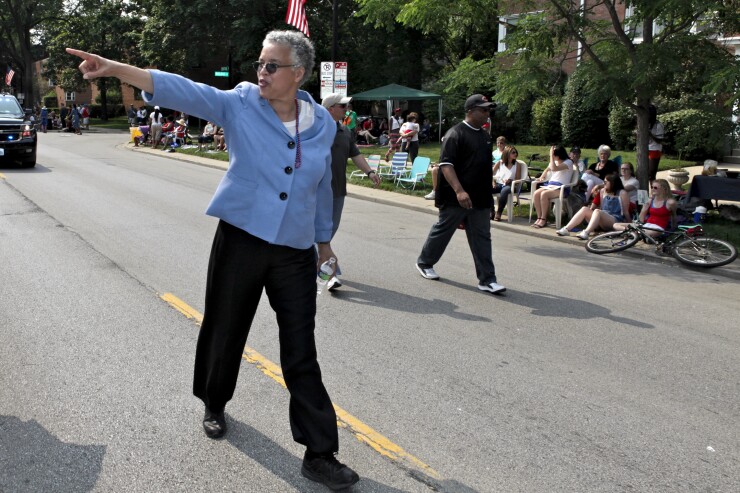CHICAGO – Cook County, Illinois’ budget pressures have eased with some revenues looking brighter than expected, allowing the county to close a projected $82 million gap without layoffs or new taxes, fines, or fees.
On Wednesday, County Board President Tony Preckwinkle unveiled a $5.92 billion

“We’ve achieved much because we’ve avoided quick fixes and one-time solutions,” Preckwinkle said in her budget address.
The improved revenues allowed the county to avoid some of the difficult choices Preckwinkle had warned of when releasing the preliminary deficit figure in June. But the county is far from out of the woods as she warned anew that commissioners have “no appetite” to raise taxes and so tough decisions lie ahead due to future structural gaps.
The budget process is expected to go more smoothly this year. Commissioners last fall moved quickly to void the sweetened beverage tax against Preckwinkle’s wishes after just a couple months of collections, leaving a $200 million budget hole.
The budget is up more than $700 million from fiscal 2018 primarily due to anticipated growth in the county’s healthcare program known as CountyCare, a Medicaid-funded insurance program, which accounts for $647 million of the increase and is primarily covered through membership.
Healthcare and public safety consume 88% of the operating budget when capital, debt service, and pension related payments are excluded. Pension fund payments total $559 million, capital spending totals $459 million and bond and interest represents $285 million.
The budget gap is being closed through higher-than-previously-anticipated membership in the health program and higher than expected tax revenues available for the general fund.
The county expects $52 million more in sales taxes and property taxes will generate $24 million more. Other major revenue sources are projected to decline by $20 million.
Although the property tax levy remains the same, lower general obligation debt service costs are freeing up some property tax revenue. The county has paid down its debt load by about 11% or $420 million since Preckwinkle took office in 2011.
The county expects to close out the current fiscal year with a nearly $300 million fund balance, down about $1 million from its target that is tied to the Government Financial Officers Association’s best practices recommendation that no less than two months of general fund spending be set aside.
Preckwinkle touted the benefits of the county’s 1% sales tax hike that took effect in 2016 in improving pension and transportation funding levels and paying down debt. Nearly $1 billion in supplemental pension contributions have been made while $107 million of debt was paid down while $139 million has gone to pay for deferred transportation maintenance. An additional $391 million in available funding in fiscal 2019 will go toward those three areas.
The budget warns of ongoing strains from the state’s fiscal woes and looming economic challenges with a warning that natural tax growth will fall short. As of August, the state owed the county $206 million in revenue for Medicaid fees, reimbursements for grants and adult probation related services.
Expenses are expected to rise by $397 million between 2019 and 2023 while projected revenues are expected to grow by just $105 million.
“Many critical revenue sources are declining over time or growing at rates below general inflation. This makes structurally balancing the budget difficult and necessitates difficult decisions,” the county warned. “To prevent future structural deficits, the County will need to either reduce expenses, identify new revenues, or replace existing revenues with ones that grow at the rate of inflation.”
The county’s finances could play prominently in the upcoming Chicago mayoral race.
Preckwinkle, who is one of more than a dozen announced candidates to succeed Chicago Mayor Rahm Emanuel, touted the county’s investment grade ratings and efforts to improve pension funding during her address, saying they’ve “been recognized by rating agencies.”
While Cook enjoys stronger ratings than Chicago and the state, it has taken hits since Preckwinkle took office with two of its ratings falling out of the double-A category.
Persistent pension pressures prompted S&P Global Ratings to
“The negative outlook reflects our view that despite the strides the county has made to improve the funding of its pension liabilities, including passing a sales tax to support payments above the state's statutory requirement, the pressures the low pension funding levels put on the county's operations could negatively affect the rating," wrote analyst Lisa Schroeer.
Fitch Ratings this year affirmed its A-plus rating and stable outlook. Moody’s Investors Service affirmed its A2 rating and stable outlook.
The county, which covers Chicago and its neighboring suburbs, has about $3.5 billion of GO debt.
The county had $7.238 billion of unfunded liabilities, including retiree pension healthcare obligations, for a funded ratio of 56.7% in 2016, compared to $7.241 billion and a funded ratio of 55.4% in 2015.





